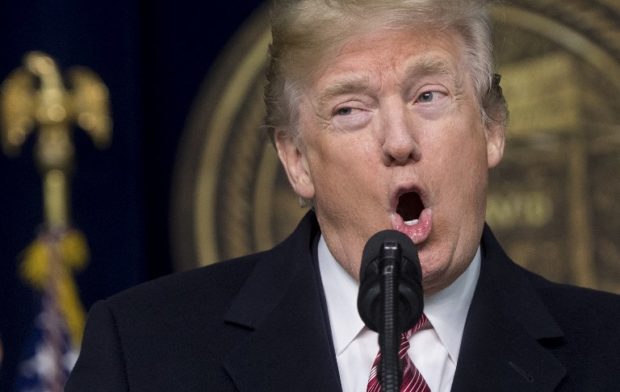WASHINGTON — US President Donald Trump sought Friday to quell a global firestorm over his reported denunciation of immigration from “shithole countries” — a slur slammed at home and abroad as racist.
Trump tweeted a convoluted denial early Friday about the comments allegedly made on Thursday at a White House meeting with lawmakers on immigration reform.
“The language used by me at the DACA meeting was tough, but this was not the language used,” Trump said, apparently referring to the remarks quoted by The Washington Post and The New York Times.
But Democratic Senator Dick Durbin — who was present at the meeting — publicly pushed back, saying Trump had repeatedly used “vile and racist” language.
Thursday’s White House huddle was held to discuss a bipartisan deal that would limit immigrants from bringing family members into the country, restrict the green card visa lottery and boost border security, in exchange for shielding hundreds of thousands of young people known as “Dreamers” from deportation.
After lawmakers raised the issue of protections for immigrants from African nations, Haiti and El Salvador, the president reportedly demanded to know why the United States should accept immigrants from “shithole countries,” rather than — for instance — wealthy and overwhelmingly white Norway.
Durbin said Trump specifically asked, “Do we need more Haitians?” before launching into a diatribe about African immigration.
Trump then “said things which were hate-filled, vile and racist,” Durbin said, adding that “shithole” was “the exact word used by the president, not just once but repeatedly.”
Trump denied he ever said “anything derogatory” about the people of Haiti.
“Made up by Dems,” he tweeted. “I have a wonderful relationship with Haitians!”
But the government of Haiti — which Friday marked the eighth anniversary of a devastating earthquake that killed at least 200,000 people — declared itself “outraged and shocked” by the “racist” slur.
Trump’s reported comments drew similar protests from the 55-nation African Union, which demanded a formal apology, while El Salvador slammed them as “deplorable.”
The State Department was left scrambling to contain the damage, with a top official saying that — while Trump denies using the language attributed to him — envoys had been briefed to convey Washington’s respect if summoned to explain themselves, as they were in Botswana.
US missions went into damage control mode. The embassy in South Africa said the United States “deeply respects” the people of Africa, and “there has been no change in our dedication to partners & friends across the continent.”
Furious Democrats and Republicans
The US president and lawmakers are currently in search of a bipartisan compromise on immigration.
Last year, Trump scrapped the Obama-era Deferred Action for Childhood Arrivals (DACA) program that protected nearly 800,000 people who came to the United States illegally as children, and set a deadline of March 5 for Congress to legislate a fix.
Trump’s language triggered a barrage of criticism from both Democrats and Republicans.
Hillary Clinton, Trump’s 2016 Democratic presidential rival, took to Twitter to blast his “ignorant, racist views of anyone who doesn’t look like him.”
Republicans were also plainly unhappy, with House Speaker Paul Ryan describing the reported comments as “very unfortunate” and “unhelpful.”
Mia Love, a Utah congresswoman of Haitian descent, called them “unkind” and “divisive” while South Carolina’s Tim Scott, the only black Republican senator, said if Trump really did use those words, it would be “disappointing.”
In praise of Martin Luther King
In an oddly-timed coincidence, the US president on Friday signed a declaration honoring slain civil rights icon Martin Luther King Jr, three days before the federal holiday celebrated in his honor.
Ignoring shouted questions about the mounting firestorm over race, the president paid tribute during a ceremony to the reverend’s “peaceful crusade for justice and equality.”
Nevertheless, the uproar has revived attention on previous remarks by Trump that have ignited accusations of racism.
Trump earned national political prominence by promoting the falsehood that Barack Obama, America’s first African-American president, was not born in the United States.
He has characterized Mexican immigrants as “rapists,” repeatedly questioned the loyalty of Muslim immigrants, denounced NFL players for kneeling during the national anthem in protest at police brutality against African Americans, and made questionable comments about a violent white supremacist rally.
The White House was also forced to deny a previous New York Times report that Trump said in a June meeting on immigration that Haitians “all have AIDS.”
Democratic congressman Luis Gutierrez put his criticism bluntly: “We can now say with 100 percent confidence that the president is a racist who does not share the values enshrined in our Constitution.”
Trump’s remarks got a particularly glacial reception from Norwegians, whom he reportedly upheld as shining examples of the immigrants he wants to come to America.
“The only thing that would attract me to emigrate to the US is your vibrant multicultural society. Don’t take that away,” declared Jan Egeland, a former UN under secretary general and the current head of the Norwegian Refugee Council.
